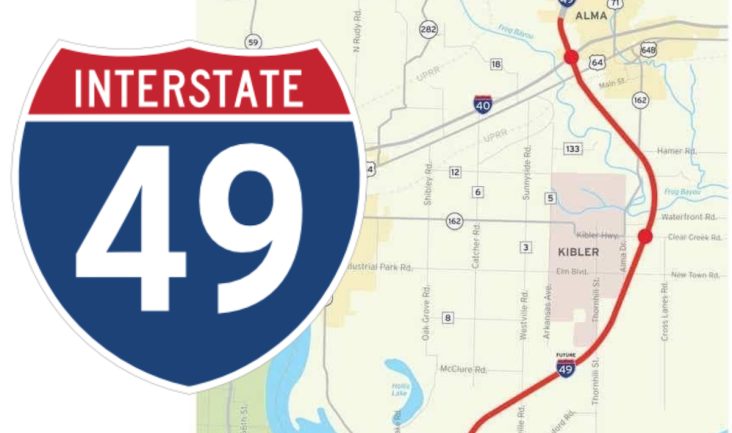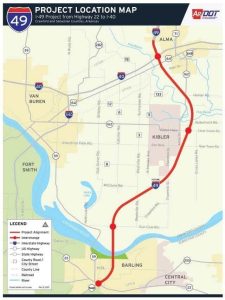I-49, infrastructure funding focus of Arkansas legislative committee meeting
by October 3, 2024 7:00 pm 1,176 views

Bipartisan work in the U.S. Congress above divisive politics and a broader appreciation for the national importance of Interstate 49 through western Arkansas are needed to deliver more funding for I-49 and other infrastructure projects in the state.
Such was part of the message from U.S. Rep. Steve Womack, R-Rogers, and Arkansas Highway Commissioner Keith Gibson. The two were in Fort Smith Thursday (Oct. 3) for a meeting of transportation committees of the Arkansas House of Representatives and the Arkansas Senate. The committees met jointly at the Arkansas Colleges of Health Education Research Institute.
During a morning meeting, the legislators heard from the Arkansas Department of Transportation (ARDOT) about ongoing efforts to build I-49 in the Fort Smith metro and other parts of western Arkansas.
ARDOT is working to build an almost 14-mile segment of I-49 in Crawford and Sebastian counties between I-40 in Alma and Highway 22 in Barling. The section is estimated to cost at least $1.26 billion.
The section received a $25 million federal grant in June and is in the running for another $250 million federal grant pursued by U.S. Sen. John Boozman, R-Ark., on behalf of ARDOT. The grant money comes from the $1.2 trillion Infrastructure Investment and Jobs Act or Bipartisan Infrastructure Law. No member of Arkansas’ Congressional delegation voted for the legislation.
Bids for the bridge part of the section will be let Oct. 9, Gibson said, with bridge work to begin in early 2025. Gibson said if the $250 million federal grant is approved, the state will still need more than $150 million to complete the section. Gibson, who lives in the Fort Smith metro, said his goal is to find money to complete the segment, and to continue building I-49 from Greenwood to north of Texarkana.

“It needs to be completed,” Gibson told Talk Business & Politics during a break in the session. “It’s time we put some emphasis on it, to change the thought process from, ‘Well, this will never be done in my lifetime,’ to ‘We can get this done if we recognize the local, the regional, and the impact it will have on the state.’”
Gibson said his “next phase” hope is to expedite construction of I-49 from Greenwood to Y City, which would create a better connection with Hot Springs to western Arkansas. Part of that push is to convince the federal government to better fund a “number one” interstate project.
“I think I-49 has been ignored for a long time. Now, I want to give credit where credit is due. We built I-49 all the way from the Missouri line to Crawford County at I-40. A lot of money has been spent on it. And we’re getting ready to spend another billion dollars to cross that river and get it over here. … We need the rest of the country to understand how important this is from a national standpoint. It’s a number one corridor. It’s been designated as corridor number one in the United States,” Gibson said.
A 1997 Arkansas and federal environmental impact statement on the I-49 route noted that the relocation of U.S. 71, which would be I-49, was a “High Priority Corridor.”
“The relocation of U.S. 71 in Arkansas is part of a congressionally designated High Priority Corridor (HPC) running from Shreveport, Louisiana to Kansas City, Missouri. Several corridors were identified as nationally important by the U.S. Congress in 1991,” noted part of the 1997 report. “These corridors are intended to complement the existing Interstate system, integrate regions of the country, improve safety and efficiency of travel and commerce, and promote economic development.”
In speaking to legislative committee members, who were mostly Republican, Womack said bipartisan efforts will be needed no matter if the GOP wins majorities in the U.S. House and Senate in the upcoming general election.
“We’re not going to have a 60-vote filibuster-proof majority in the Senate. So we’re still going to have a divided government. And somehow, someway, we’re still going to have to bring two different sides to the table and find solutions that benefit the country as whole, even though it may not be everything you want,” Womack said.
